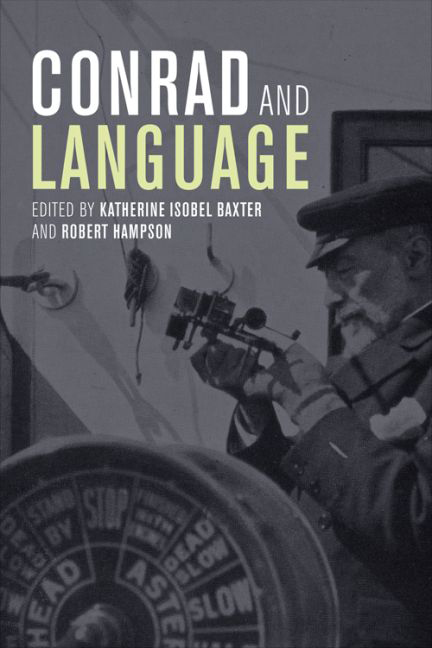Book contents
- Frontmatter
- Contents
- A Note on Texts
- Introduction
- 1 Conrad and Nautical Language: Flying Moors and Crimson Barometers
- 2 Navigating the ‘Terroristic Wilderness’: Conrad's Language of Terror
- 3 Conrad, G. E. Moore and Idealism
- 4 Conrad's Language of Passivity: Unmoving towards Late Modernism
- 5 The Powers of Speech in Conrad's Fiction
- 6 ‘Soundless as Shadows’: Language and Disability in the Political Novels
- 7 Conrad and Romanised Print Form: From Tuan Almayer to ‘Prince Roman’
- 8 Languages in Conrad's Malay Fiction
- 9 Gallicisms: The Secret Agent in Conrad's Prose
- 10 ‘The speech of my secret choice’: Language and Authorial Identity in A Personal Record
- 11 The Russian Redemption of The Secret Agent and Under Western Eyes
- Afterword
- Contributors
- Index
11 - The Russian Redemption of The Secret Agent and Under Western Eyes
Published online by Cambridge University Press: 12 September 2017
- Frontmatter
- Contents
- A Note on Texts
- Introduction
- 1 Conrad and Nautical Language: Flying Moors and Crimson Barometers
- 2 Navigating the ‘Terroristic Wilderness’: Conrad's Language of Terror
- 3 Conrad, G. E. Moore and Idealism
- 4 Conrad's Language of Passivity: Unmoving towards Late Modernism
- 5 The Powers of Speech in Conrad's Fiction
- 6 ‘Soundless as Shadows’: Language and Disability in the Political Novels
- 7 Conrad and Romanised Print Form: From Tuan Almayer to ‘Prince Roman’
- 8 Languages in Conrad's Malay Fiction
- 9 Gallicisms: The Secret Agent in Conrad's Prose
- 10 ‘The speech of my secret choice’: Language and Authorial Identity in A Personal Record
- 11 The Russian Redemption of The Secret Agent and Under Western Eyes
- Afterword
- Contributors
- Index
Summary
Readers of world literature rely heavily on translations. In Russia, translation has been used as a form of censorship that was exercised through the careful selection of works for translation. Russian censorship banned foreign works that criticised the existing political regime, as well as those that portrayed Russians as ‘non-European barbarians’, and, if necessary, allowed publications of world texts only with excisions. This practice lead to the erasure of some authors, like James Joyce, and the misrepresentation of others, like Joseph Conrad. Conrad's political novels have been noticeably absent from the list of his works published in Russia after 1925. Focusing on Conrad's sea-stories, Russian critics branded him as a neo-romantic and aligned him with the likes of Robert Louis Stevenson and Arthur Conan Doyle, defining him as a master of sea adventures, exotic tales and romantic melodramas. They dismissed Conrad's works about any other topic as inferior and insignificant. Kagarlitsky and Katarsky suggest that ‘Conrad's weakest works are the ones where he gives up his favorite themes and gets fascinated by the analysis of the broken immoral psyche.’ Russian critics have also portrayed Conrad as a European novelist whose work is littered with the expected errors, illustrative of outmoded aesthetics and, despite all of this, still somewhat commendable. Critics praised him for choosing to dramatise the real efforts of real men engaged in struggles with natural forces, rather than indulging in the temptation to chart the vapid lives of the bourgeoisie. With his political novels played down, repudiated or erased, in Russia Conrad remained in the literary backwater, his status marginal when compared with that of Shakespeare, Dickens, Graham Greene, H. G Wells, Galsworthy and Somerset Maugham, all of whom had long been staples in any university course of British literature.
- Type
- Chapter
- Information
- Conrad and Language , pp. 186 - 203Publisher: Edinburgh University PressPrint publication year: 2016

